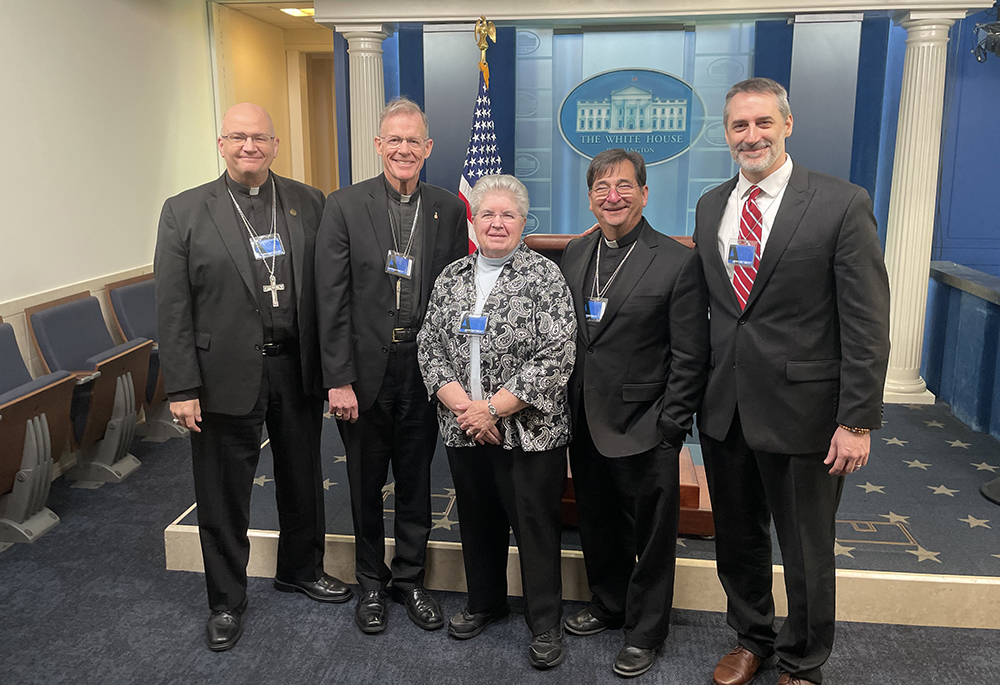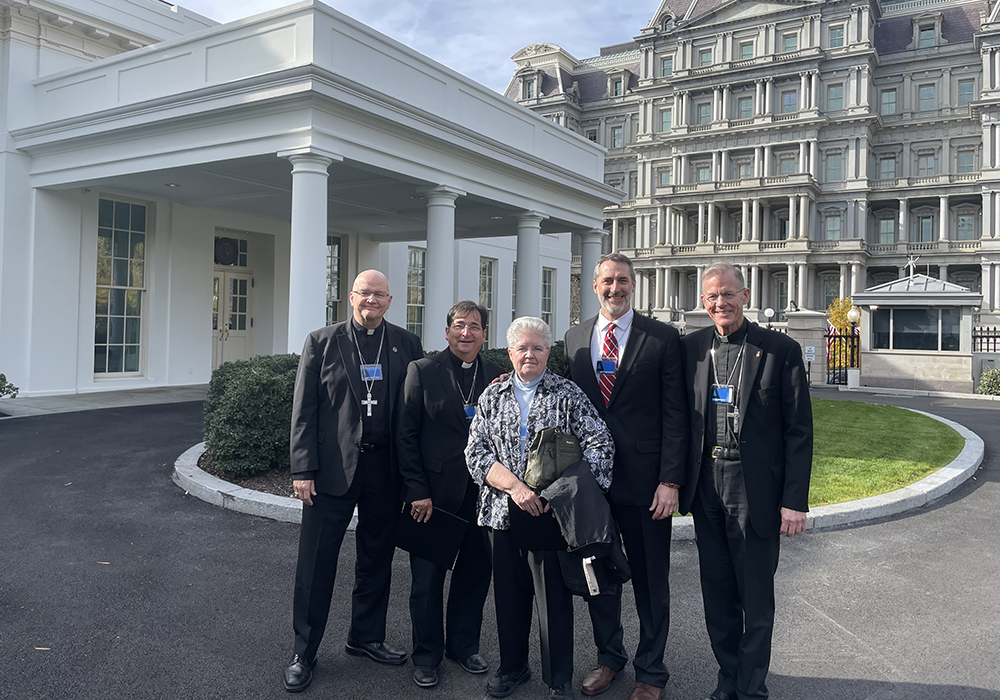
Bishop Edward Weisenburger (Diocese of Tucson, Arizona), Archbishop John Wester (Archdiocese of Santa Fe, New Mexico), St. Joseph Sr. Carol Zinn (executive director of the Leadership Conference of Women Religious), Bishop Joseph Tyson (Diocese of Yakima, Washington), and Franciscan Lonnie Ellis (executive director of In Solidarity) at the White House for a meeting about climate change on Nov. 17. (Courtesy of In Solidarity)
A group of U.S. bishops, led by Santa Fe, New Mexico, Archbishop John C. Wester, and a Catholic sister met with senior White House officials about Pope Francis' latest climate letter, Laudate Deum, for 45 minutes on Nov. 17.
Bishop Edward Weisenburger of Tucson, Arizona, Bishop Joseph Tyson of Yakima, Washington, and St. Joseph Sr. Carol Zinn, executive director of the Leadership Conference of Women Religious, joined Wester at the meeting. Franciscan Lonnie Ellis, executive director of Catholic communications consulting nonprofit In Solidarity, who was also present, organized the meeting with Wester.
The bishops and Zinn shared the U.S. bishops' conference's support for potential forthcoming pollution-limiting rules from the Environmental Protection Agency with senior Biden White House officials, including John Podesta, senior adviser to the president for clean energy innovation and implementation, who was previously former President Bill Clinton's chief of staff, Ali Zaidi, national climate adviser, and John McCarthy, senior adviser for political engagement.
Because delays in finalizing the rules could make them more vulnerable to legal challenges or repeal by a future president or Congress, the bishops and Zinn pressed the administration to finalize rules on methane, carbon pollution from power plants, soot pollution and emissions standards for heavy-duty vehicles by the end of April 2024.
Ellis said he was pleased to hear that White House officials expected to finalize the rules by the end of April. Ellis also expressed hope about rumors that the Biden administration* hopes to finalize their methane rule before COP28, the annual United Nations climate change conference set to take place in Dubai, United Arab Emirates, from Nov. 30-Dec. 12 this year.
Catholic meeting participants expect future collaboration with the White House on climate issues, particularly around environmental justice. Ellis was also pleased to hear the White House say they would follow up with the group, especially because advocacy groups often have to initiate follow-up.
The bishops shared stories of how fires and heat waves are affecting the people of their dioceses.
Tyson brought the perspective of climate change's impacts on his diocese's agriculture and fishing to the meeting. "John Podesta had a very detailed knowledge of some of the issues around the fisheries, the salmon and the Columbia River watershed," Tyson said.
Tyson said the group discussed polarization and how to bring people around "a common table."
"How do we bring people together, people who might be in conflict, and create some kind of social friendship among very competing stakeholders to really care for the environment, care for God's creation?" he said.
Ellis recalled Zinn saying during the meeting, "We're here because someone needs to speak about who is hurt first and worst from climate change."

Bishop Edward Weisenburger (Diocese of Tucson), Bishop Joseph Tyson (Diocese of Yakima), St. Joseph Sr. Carol Zinn (executive director of the Leadership Conference of Women Religious), Lonnie Ellis (executive director of In Solidarity), and Archbishop John Wester (Archdiocese of Santa Fe) outside the White House for a meeting about climate change on Nov. 17. (Courtesy of In Solidarity)
Catholic meeting participants were pleased with how the conversation went, with Ellis calling it "a refreshing conversation," especially because White House officials took more than the scheduled 30 minutes and because of the surprise attendance of Podesta.
Tyson emphasized the importance of "tend[ing] to the relationships" with the White House. "We don't agree with everything that comes out of any administration. There's tension," Tyson said of the bishops' conference position on various political issues.
While the meeting was organized on too short of notice for the U.S. bishops' conference to formally participate, the conference was supportive of the meeting, Ellis said, adding that some bishops who wanted to participate were not available.
Francis' apostolic exhortation on the climate crisis came on Oct. 4, two months before the U.N. global climate summit. Francis, whose 2015 encyclical "Laudato Si', On Care for Our Common Home," was credited with building momentum ahead of a historic agreement in Paris at COP21, will this year be the first pope ever to attend a U.N. climate summit.
In Laudate Deum, Francis called for urgent action at COP28 and took particular aim at the United States as a major emitter.
Advertisement
"If there is sincere interest in making COP28 a historic event that honors and ennobles us as human beings, then one can only hope for binding forms of energy transition that meet three conditions: that they be efficient, obligatory and readily monitored," Francis wrote.
Francis also highlighted that the U.S. outstrips other major emitters in greenhouse gas emissions per capita.*
The meeting at the White House comes after the U.S. bishops' conference spent a week meeting in Baltimore, where Francis' climate teaching was largely sidelined. The pope's climate letter and other environmental topics did not make it onto the agenda for the public sessions in Baltimore, and the White House meeting was organized by individual U.S. bishops, not the conference.
At their meetings, the bishops' conference decided that abortion would continue to be the "preeminent priority" in their guidance for Catholic voters, prioritizing it above climate change.
Baltimore Archbishop William Lori, vice president of the bishops' conference, explained why the bishops' conference chose to elevate abortion above climate change, saying, "We recognize that the effects of [climate change and other ecological concerns] are indirect rather than direct. That does not make them less serious. It however does affect how we have weighted things."
Of the Nov. 17 meeting, Tyson said that, by "being a resource to" the people in government, the bishops are "trying to help Democrats be better Democrats and Republicans be better Republicans."
*This story has been updated to clarify comments by Lonnie Ellis and to clarify Pope Francis' remarks about the world's major emitters of greenhouse gases.








